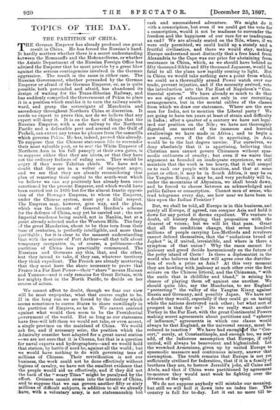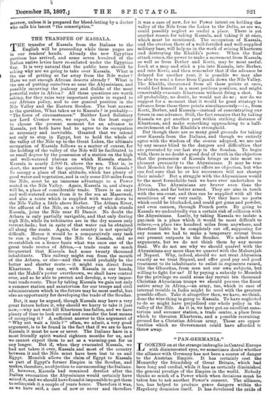TOPICS OF THE DAY.
THE PARTITION OF CHINA. THE German Emperor has already produced one great result in China. He has forced the Russian's hand. It hardly matters whether there is a secret understanding between the Romanoffs and the Hohenzollerns, or whether the Asiatic Department of the Russian Foreign Office has advised the Emperor that he must provide by a great blow against the serious contingencies involved in the German aggression. The result is the same in either case. The Russian Government, whether persuaded by the German Emperor or afraid of the German Emperor, or, as is quite possible, both persuaded and afraid, has abandoned its design of waiting for the Trans-Siberian Railway, and has suddenly compelled the Government of Pekin to place it in a position which enables it to turn the railway south- ward, and grasp the sovereignty of Manchuria and ascendency throughout Northern China at discretion. It needs no expert to prove this, nor do we believe that any expert will deny it. It is on the face of things that the Russian Emperor, with a safe railway to the Northern Pacific and a defensible port and arsenal on the Gulf of Pecheli, can extort any terms he pleases from the camarilla which governs Pekin. He has, indeed, proved this already. To suppose that the Chinese statesmen like to surrender their most valuable port, or to seat the White Emperor of Northern Asia in his full panoply at their own gates, is to suppose either that they are idiots, or that they have not the ordinary feelings of ruling men. They would be angry if they were Tahitian chiefs. We have not a doubt that they are in a welter of impotent anger, and we see that they are already reconsidering that plan of removing their capital to the south-west which we believe we can say positively has already been once sanctioned by the present Emperor, and which would have been carried out in 1895 but for the almost frantic opposi- tion of the Dowager Empress, to whom the Emperor, under the Chinese system, must pay a filial respect. The Empress may, however, give way, and the plan, which was the keynote of General Gordon's scheme for the defence of China, may yet be carried out ; the new Imperial residence being seated, not in Nankin, but at a point already selected under the Western Hills. The fury of the great Mandarins, about to be thus torn from their base of centuries, is perfectly intelligible, and more than justifiable ; for it is clear to the meanest understanding that with the seizure of Port Arthur—all that talk about temporary occupation is, of course, a politeness—the partition of China has practically commenced. The Russians and Germans say this, that, and the other, but they intend to take, if they can, whatever territory they think expedient. The French are already muttering that they must have the share necessary to prove that France is a Far East Power—their " share " means Hainan and Yunnan—and it only remains for Great Britain, with her mighty fleet in the North Pacific, to decide on her course of action.
We cannot affect to doubt, though we fear our view will be most unpopular, what that course ought to be. If in the long run we are forced by the destiny which seems sometimes to coerce States to share unwillingly in the partition of Empires, so be it. We cannot contend against what would then seem to be the Providential government of the world. But so long as our statesmen have free-will left them we would not take, or even accent, a single province on the mainland of China. We would ask for, and if necessary seize, the position which the Admiralty consider best adapted for a great naval station —we are not sure that it is Chusan, but that is a question for naval experts and hydrographers—and we would hold that station, by battle if need be, against all the world ; but we would have nothing to do with governing tens of millions of Chinese. Their revivification is not our business, the work could not be done effectively without legions of cavalry, we have not the smallest evidence that the people would aid ns effectively, and if they did not the back of the " weary Titan" might be paralysed by the effort. Cruisers cannot steam into the interior of China, and to suppose that we can govern another fifty or sixty millions of difficult subjects, in addition to all we already Ihave, with a voluntary army, is not statesmanship but rash and unconsidered adventure. We might do it with a conscription, but even if we could get the vote for a conscription, would it not be madness to surrender the freedom and the happiness of our race for so inadequate an end? We are already seated on the Nile, where, if we were only permitted, we could build up a stately and a fruitful civilisation, and there we would stay, making Europe understand most distinctly that a free hand from Alexandria to the Cape was our price for abstaining from resistance in China, which, as we should have behind us fifty thousand Sikhs and fifty thousand Japanese, would be fatal to all the plans now rapidly coming to light. But in China we would take nothing save a point from which we could as a thoroughly armed Power watch over our trade, prevent injustice, and if the necessity arrived, veto the introduction into the Far East of Napoleon's " Con- tinental system." We have already so much to do that we see signs of exhaustion not only in our recruiting- arrangements, but in the mental calibre of the classes from which we draw our statesmen. Where are the new men for India, not to mention the Liberal party ? We• are going to have ten years at least of strain and difficulty in India ; after a quarter of a century we have not legal- ised our position on the Nile ; we have not thoroughly digested one morsel of the immense and hurried swallowings we have made in Africa ; and to begin a new meal, even if the diet is appetising, in Asia would be to the last degree unwise. For ourselves, we deny absolutely that it is appetising, believing that Christian men cannot govern Chinamen without spas-. modic outbursts of cruelty ; but even if we waive that argument as founded on inadequate experience, we still maintain that the work is too heavy, that it will compel us to rack our people with taxation, and that at some. point or other, it may be in South Africa, it may be on the Yangtse Kiang, it may be, and very probably will be, under the mountains of Abyssinia, we shall break down, and be forced to choose between an acknowledged and' public failure or conscription. Cannot men of sense, who read telegrams every day, see how near we have been to this upon the Indian Frontier ?
But, we shall be told, all Europe is in this business, and. surely all Europe, if agreed, can conquer Asia and hold it down for any period it deems expedient. We venture to doubt, all history denying that proposition with the clearest of voices ; but we will let that pass. Grant that all the conditions change, that seven hundred millions of people carrying Lee-Metfords and revolvers cannot defend themselves, that the " audacious brood of Japhet " is, if united, irresistible, and where is there a symptom of that union ? Why the races cannot for jealousy and greed decide harmoniously on the future of the petty island of Crete ! Is there a diplomatist in the world who believes that they will agree over the distribu Lion of such a prize as Asia ? At this very moment they are howling with jealousy at each other over the first seizure on the Chinese littoral, and the Chinaman, " with the smile that is childlike and bland," is seizing his chance of playing them off against one another. We should quite like, say the Mandarins, to see England " protecting " the valley of the Yangtse Kiang against Russia and Germany, and possibly Japan. We have not a doubt they would, especially if they could go on taxing while the nations destroyed each other; but what sort of prospect is that for us ? Do we really want another Turkey in the Far East, with the great Continental Powers making secret agreements about partitions and " spheres of influence," agreements in which one clause would always be that England, as the universal enemy, must be reduced to inaction ? We have had enoughlof the "Con- cert," surely, at Constantinople, and enough too, we may add, of the ludicrous assumption that Europe, if only united, will always be benevolent and highminded. Let the wretched Armenians, given up by united Europe to spasmodic massacre and continuous misery, answer that assumption. The truth remains that Europe is not yet sufficiently civilised for federation, that if it is a, family of brothers they are, to borrow Jerrold's joke, all Caine and Abels, and that if China were partitioned by agreement to-morrow they would next week be fighting over the division of the spoil.
We do not suppose anybody will mistake our meaning, but still we will boil it down into an index line. This country is full for to-day. Let it eat no more till to- morrow, unless it is prepared for blood-letting by a doctor who calls his lancet "the conscription."



































 Previous page
Previous page